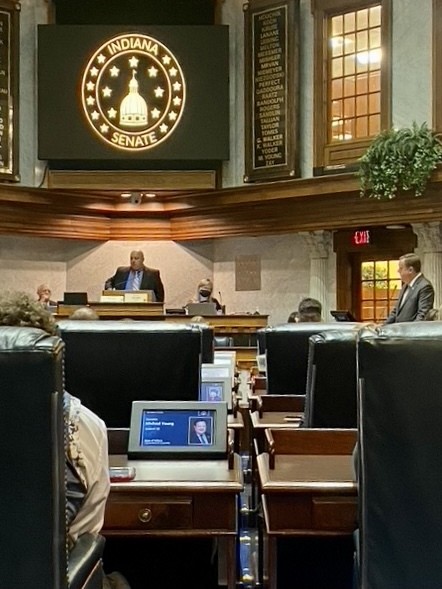
Indiana Senate Republicans on Monday morning heard public testimony for the first time — and for the last time as well — on their proposed redrawing of the state’s congressional and legislative districts, a process that they are intent on wrapping up during the next four days.
Though the final opportunity for public testimony before the Indiana General Assembly on the redistricting legislation, House Bill 1581, the meeting of the Senate Elections Committee drew a crowd comparable to those of two public hearings held earlier this month in the Indiana House, and the first of Monday’s speakers said he knew why.
“It doesn’t feel like democracy when the timing of this meeting was announced less than a week ago,” said Robbie Slaughter, an independent candidate for Congress. “It’s probably why there aren’t many folks here. It’s hard to get off work when you have less than a week.”
Introducing the redistricting legislation, Senate sponsor Eric Koch (above, right), R-Bedford — who, as a House member, was primary author of the Republican-drawn 2011 redistricting legislation — told committee members that Indiana’s 4.7% overall growth during the past decade was disproportionately concentrated in counties surrounding Indianapolis.
The corresponding loss of population in outlying areas, particularly southwestern and northwestern Indiana, made this year’s redistricting process more difficult, he added.
“Districts had to grow, or shrink, or sometimes be combined,” Koch said. Like House author Greg Steuerwald, R-Avon, he identified the map-drawers’ goals as transparency and low population deviation among districts.
“We strove to maintain communities of interest,” Koch said. “We strove for compactness.”
Asked by a Democratic committee member, Fady Qaddoura of Indianapolis, if competitive districts were among the goals, Koch replied that they weren’t and even if they were, would be difficult to achieve in a state so heavily Republican.
“Competitiveness is not a legal requirement,” Koch said. “Eighty-eight percent of our local officials are Republican. If one has the aspirational goal of drawing competitive districts it is very difficult.”
“We were striving to meet the legal requirements,” he added. “There have been efforts to codify other goals and we’ve opted not to do that.”
Qaddoura countered that the map-drawers should consider other metrics that show Democrats winning about 44 percent of the vote in statewide elections.
“I’ll be asking all my colleagues during the next four days to adopt these metrics,” Qaddoura said.
The two dozen people who testified during the 2 1/2 hour hearing — most of whom had testified in the two previous House hearings — were uniformly critical of the legislation and their arguments generally echoed those in the previous hearings.
Focusing on the proposed Indiana Senate districts that were released six days before, the division of Fort Wayne and Evansville into multiple districts drew specific criticism.
Peg Maginn of the League of Women Voters of Fort Wayne noted that Indiana’s second-largest city would be more divided than it is now: “My community, Fort Wayne, is further divided into four districts instead of three.”
Maginn also told committee members that the disproportionate number of safe seats resulting from the Republican-drawn maps now in effect would continue under the proposed legislation, resulting in the real competition occurring among the political extremes in both major parties.
That has resulted, she added, in the election of Republican extremists who cast doubt on the validity of President Biden’s election and the efficacy of vaccines against the coronavirus — an assertion that led the committee’s chairman, Sen. Jon Ford, R-Terre Haute, to interrupt her to ask her to keep her testimony relevant to the proposed legislation.
“I think this is very relevant,” Maginn replied, “because this is the effect of the maps.”
Toward the end of the hearing, testimony focused on the proposed redistricting’s effect on minority communities, particularly in Lake, Allen and Marion counties.
As in an earlier legislative hearing before the release of the maps, Ami Gandhi, senior counsel for the Chicago Lawyers’ Committee for Civil Rights, warned the map drawers of the potential for violating the Voting Rights Act due to the “cracking” — splitting between districts to lessen the political impact — of minority communities.
Quoting from testimony that Gandhi’s group, the NAACP of Indiana and not-for-profit Count US Indiana provided to the committee: “A preliminary analysis suggests that there are multiple examples where communities of color have been ‘cracked,’ breaking our communities apart into multiple House or Senate districts. The legislature must redraw such districts to keep communities of color together, or they risk violating the federal Voting Rights Act.”
“Demographics across Indiana are shifting,” the testimony concludes. “In accordance with federal law, electoral maps must shift with them. Communities of color have the right to elect candidates of our choice who represent and are held accountable to the interests of our communities. The State of Indiana must do better to protect voting rights of people of color.”
Robert Buggs of the NAACP in Gary told the map-drawers that the district lines in minority communities marginalize the interests of the voters there.
“You all are putting them in a corner like they’re pawns,” he said. ” … What you’re doing, you’re changing people’s lives adversely.”
The committee is scheduled to vote Tuesday morning on the redistricting legislation, which if approved would go to the full Senate where debate would begin Thursday.
A final vote is scheduled for Friday morning; passage would send the legislation to Gov. Eric Holcomb unless it were amended this week to differ from the House-passed legislation. House Speaker Todd Huston, R-Fishers, has told House members to be prepared to reconvene on Friday afternoon to vote on whether to concur — which also would send the legislation to Holcomb — in the event the Senate amended the legislation. — The Indiana Citizen.
Haley Pritchett of TheStatehouseFile.com contributed reporting through The Indiana Citizen redistricting reporting project, which was organized with assistance from the Hoosier State Press Association.